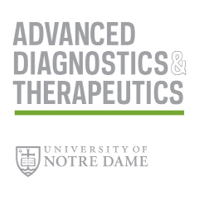

The Advanced Diagnostics & Therapeutics initiative at the University of Notre Dame is pleased to announce that it has awarded seed funding to five new research projects across three interdisciplinary themes: precision medicine, environmental health, and mobile diagnostics. In each case, the funds will be used to gather preliminary data and validation of innovative ideas proposed by Notre Dame faculty and their collaborators to solve difficult real-world problems.
Precision Medicine
3D Reconstruction of Tumor Biopsies: an Nth-Dimensional Imaging Approach for Next Generation Diagnostics
The overarching aim of this project is to answer fundamental scientific questions required to develop an imaging system that produces information-rich 3D composite reconstructions of tumors and tumor microenvironments. Such a diagnostic tool, if successful, could unleash the multi-dimensional information from tumor biopsies, dramatically improve the diagnostic power of the standard clinical biopsy, and transform the ability of physicians to understand cancer invasiveness.
- David Hoelzle, Assistant Professor, Department of Aerospace and Mechanical Engineering, University of Notre Dame
- Jeremiah Zartman, Assistant Professor, Department of Chemical and Biomolecular Engineering, University of Notre Dame
- Siyuan Zhang, Nancy Dee Assistant Professor of Cancer Research, Department of Biological Sciences and Harper Cancer Research Institute, University of Notre Dame
Role of Macrophage‐derived EMAP II in Neovascular Recovery from Hindlimb Ischemia
This collaboration between Notre Dame and the Indiana University School of Medicine-South Bend will examine the role that a biologically important protein known as EMAP II plays in the growth of new blood vessels and in wound repair. The researchers will look at how control of EMAP II could reduce inflammation and speed recovery time from trauma and wounds.
- Joel Boerckel, Assistant Professor, Department of Aerospace and Mechanical Engineering, University of Notre Dame
- Margaret Schwarz, Professor, Department of Pediatrics, Indiana University School of Medicine
Environmental Health
Novel Diagnostics for Biotransport of Aquatic Environmental Contaminants
This partnership with Central Michigan University will develop a new diagnostic approach akin to “chemical forensics” to assess how fish accumulate and disperse important environmental contaminants that also have human health implications. Specifically, the group is trying to determine how and when Great Lakes fish of economic importance—namely Pacific salmon and native walleye—accumulate heavy metals and other toxins.
- Gary Lamberti, Professor, Department of Biological Sciences, University of Notre Dame
- Dominic Chaloner, Research Associate Professor, Department of Biological Sciences, University of Notre Dame
- Matthew Cooper, PhD candidate, Department of Biological Sciences, University of Notre Dame
- Donald Uzarski, Professor, Department of Biology, Central Michigan University
A New SERS-based Approach for the Detection of Environmental Pollutants
The goal of this project is to develop a highly sensitive, low-cost, rapid, and on-site detection method for environmental contaminants using surface-enhanced Raman spectroscopy (SERS). The initial detection target will be hydrazine, a widely used agent for pesticide and pharmaceutical synthesis, plastics manufacturing, rocket fuel, and a variety of other purposes. Hydrazine is also an EPA Group B2 probable carcinogen that can cause severe damage to the liver, kidneys, and central nervous system in humans.
Jon Camden, Associate Professor, Department of Chemistry and Biochemistry, University of Notre Dame
Mobile Diagnostics
Using Speech as an Early Marker and Predictive Classifier of Autism Spectrum Disorder (ASD)
This collaborative research with Saint Mary’s College will investigate the feasibility of using speech analysis as an early marker and classifier of autism and to develop a first set of prototypes of low-cost and portable ASD risk analysis and assessment tools (on devices such as smartphones and tablets) for practitioners and/or parents. The work will study a novel, non-intrusive, and easy-to-collect marker for ASD and may lead to practical tools for early detection of ASD and continuous assessment of children with autism.
- Christian Poellabauer, Associate Professor, Department of Computer Science and Engineering, University of Notre Dame
- Patrick Flynn, Duda Family Professor of Engineering, Department of Computer Science and Engineering, University of Notre Dame
- Sandra Schneider, Associate Professor of Communicative Sciences and Disorders, Saint Mary’s College
- Susan Latham, Associate Professor of Communicative Sciences and Disorders, Saint Mary’s College
For more information about specific projects, please contact the investigators. To learn more about Advanced Diagnostics & Therapeutics, precision medicine, or similar areas of Notre Dame research, contact Arnie Phifer at aphifer@nd.edu or 574-631-3057.